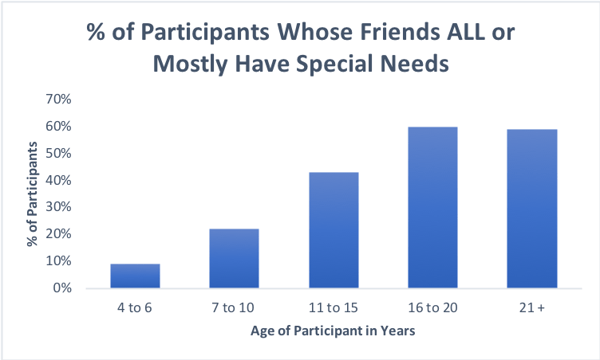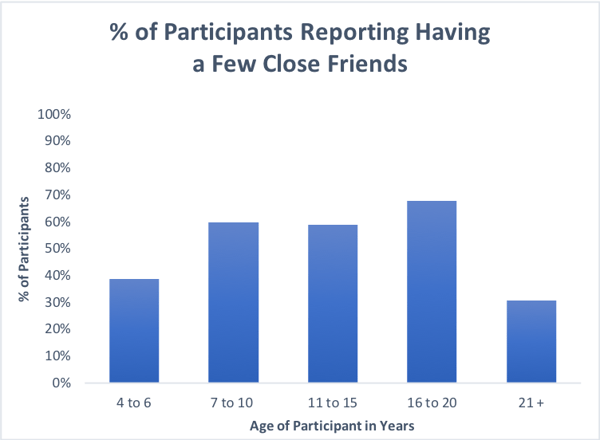Most people with PWS are social and enjoy spending time with family and friends. However, making and keeping friends can be difficult for people with PWS. Because of food issues, people with PWS often need supervision and monitoring, which can make it difficult for them to participate in many social and leisure activities, so many of which commonly include food. Additionally, because of emotional dysregulation, people with PWS can become more easily upset over changes in schedules and expectations. These factors can make developing and maintaining friendships challenging.
Recently, we reviewed responses in the Global PWS Registry related to friendship in PWS. 39% reported that their child with PWS has a best friend and about half said this best friend also had special needs. These 2 findings were based on data across all PWS age groups in the registry. However, if the data are broken down into age groups (see graph below), then the % of participants whose close friends also have special needs tends to increase with age. As a person with PWS ages, they may find it easier and more satisfying connecting with others who have had similar life experiences.

There were more interesting findings. Across all PWS age groups, 46% reported their child also had “a few other close friends” (see graph below), but 30% of respondents reported that their child had “no close friends”. Additionally if we look at the data across age groups, the % of people with PWS who have “a few close friends” tends to be much lower in the adult group (over 21 yrs. ). This is consistent with clinical data suggesting that friendships among individuals with special needs may be more difficult as they age. This may be the result of fewer social contacts and activities after high school and transition programs are completed. Graduation, then, may be a particularly vulnerable age for our loved one with PWS in terms of their social opportunities and potential for loneliness.

Friendship in PWS: Putting the data into context
The current registry data show that, although the many school age children with PWS do have at least a few close friends, friendships for people with PWS can still have some challenges. Across all age groups, registry respondents reported that less than half (39%) of the people with PWS have a best friend. Reports on rates of friendship in the general population vary, but one report indicates that about 10% of typically-developing people report not having a best friend or other close friends. The rates of those reporting no best or close friends in the PWS registry data is three times higher (>30%) than of the experience of the general population. Other reports on friendship indicate that typically-developing children generally have an average of about 5 friends.
Thus, the PWS Registry data reflect that rates of having a best friend and/or a few close friends is lower than what is typically seen in the general population. But it should also be noted that psychologists believe that friendship is highly individual, and depends on the person and their needs. For many individuals, 1 or 2 close relationships can be very satisfying.
How can we help our loved ones with PWS?
Consider your child, his or her particular temperament (e.g., shy vs. outgoing) and their circle of friends. It may be important to give focus to this aspect of their life especially as they get older. Social connections are very important for not only emotional well-being and quality of life, but also for physical health. And it may only take 1 or 2 close friends to make a difference. If the person you care for with PWS is isolated or unhappy about their level of social connections, consider having them get involved in a structured social group or other program that could be a source of friendship. Here are some ideas and more information:
- FPWR has funded a 2 year project, the BOSS Study, focused on developing social connections for people with PWS
- Contact your child’s school or transition program (for post high school) to ask about social skills groups or other activities they could participate in. Social programs and friendship groups that cater to young people with Autism Spectrum diagnosis (ASD) can also be a good match for some people with PWS even if they do not have an ASD diagnosis.
- Look for opportunities for your child to join a sports team e.g., Special Olympics, Unified Sports, ask schools or therapists who specialize in this area for suggestions
- Explore your city Parks & Recreation departments for specialized programs for children and adults with disabilities and similar organizations that offer social and recreation opportunities and events (look up specialized recreation programs near you or directly through your city Parks and Recreation website for 'specialized recreation')
- Best Buddies International: this program matches typical aged peers with individuals with developmental disabilities for friendship and activities, focus is on high school and college aged individuals. Many states have a local chapter
- In the community: Church or spiritual gatherings, Be a regular at a coffee shop, library or bookstore, take a class at the local YMCA or Parks Department.
- On-line: with appropriate boundaries and supervision the on-line world can be a good place for people with a variety of challenges and disabilities to connect and maintain friendship. There are Facebook groups and other forums focused in this area. Additionally video chatting can be another great way to keep up with friends and family who live far away.
If you have not joined or completed your Registry questionnaires this is a gentle nudge! Data from the Global PWS Registry will continue to inform this work, and help us understand what things are challenging and what is working for families.
For guidance on how to enroll in the Global PWS Registry please download the Instruction Guide for Getting Started with the PWS Registry. Already enrolled and want to update your surveys? Download the Guide to Updating Your Surveys.








